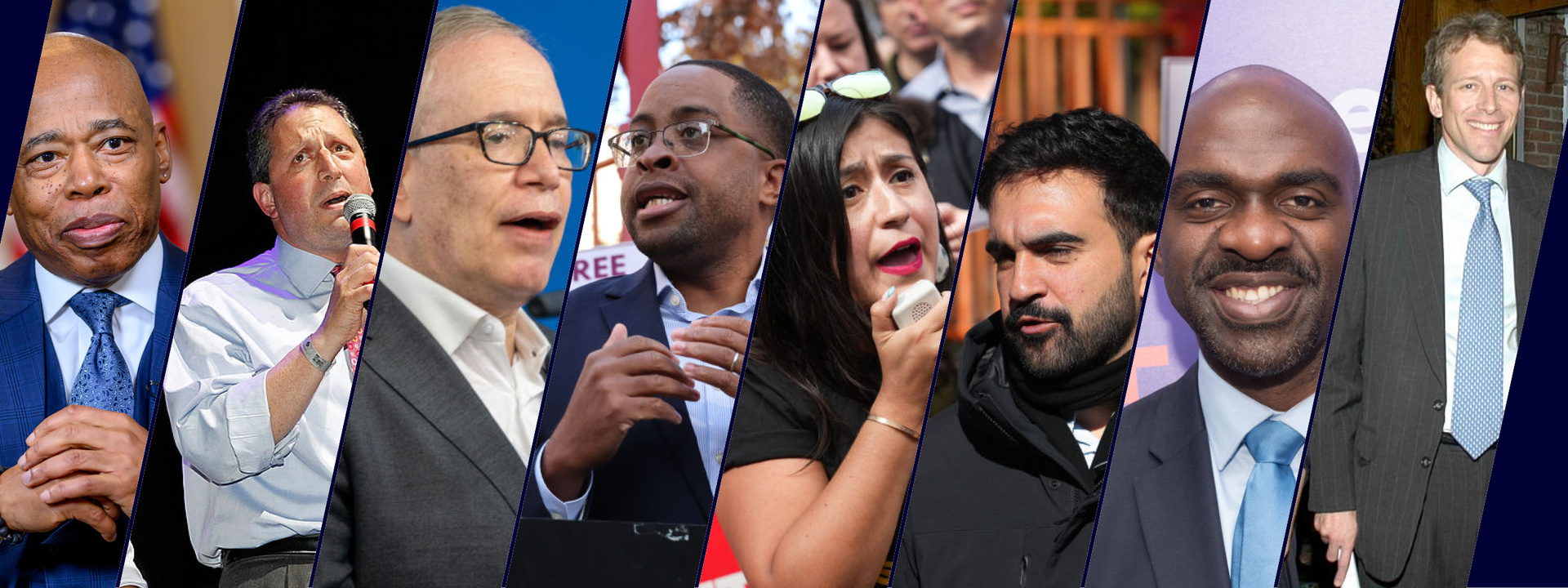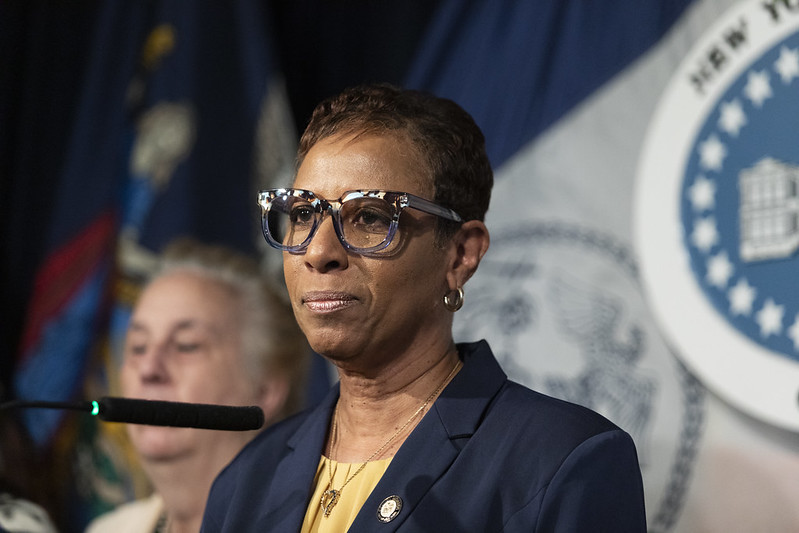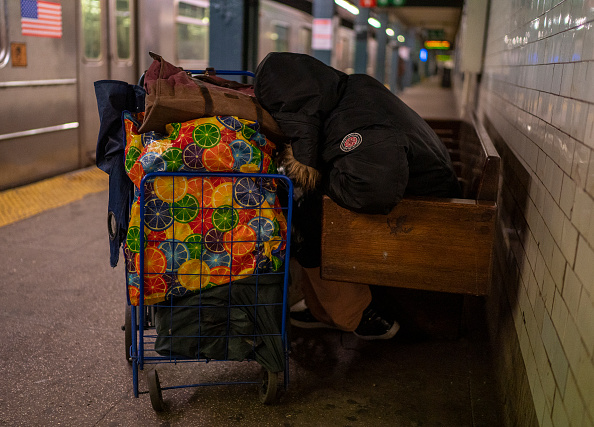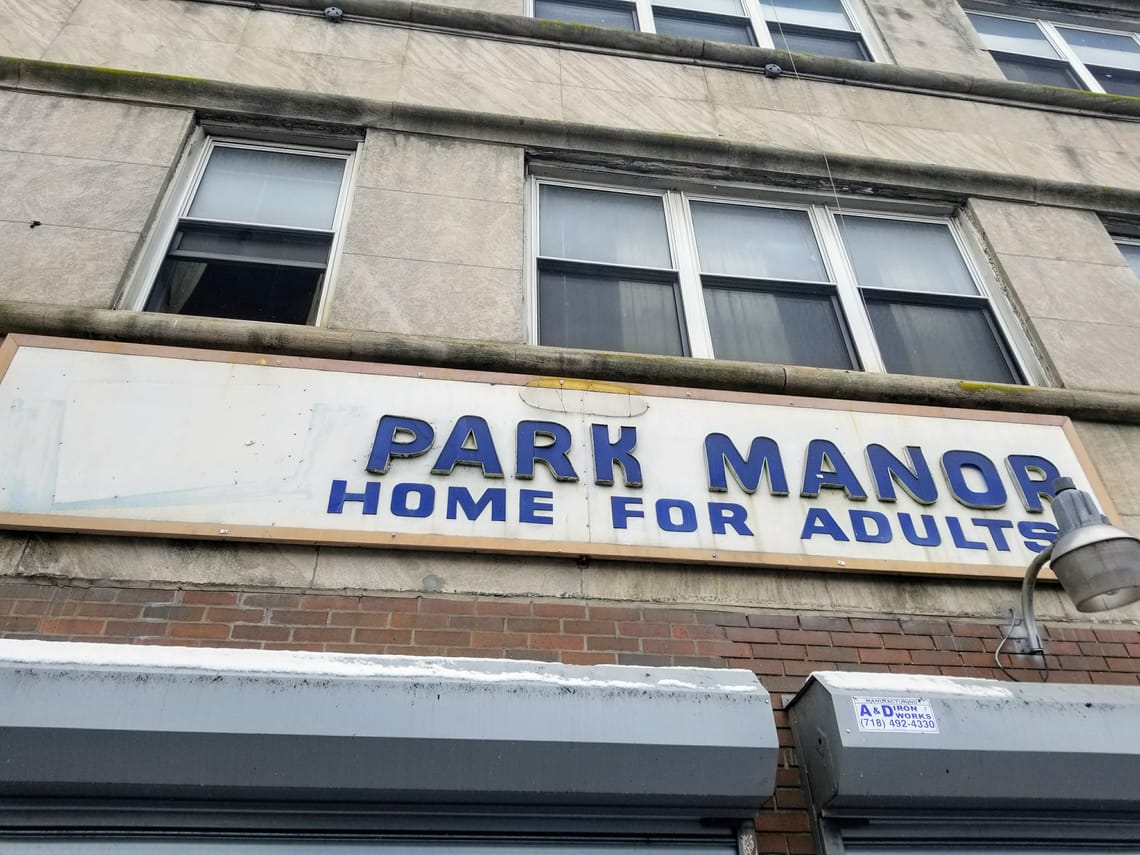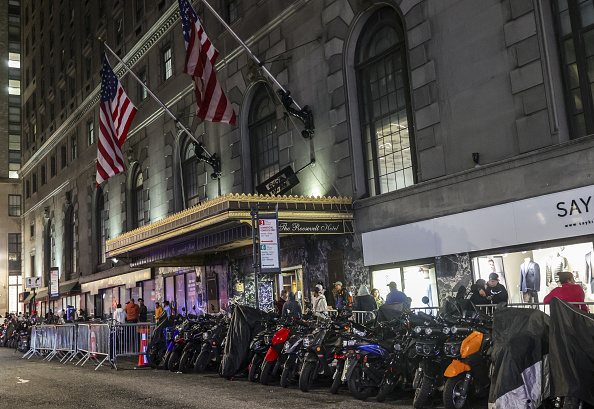|
Forwarded this email? Sign up for free to have it sent directly to your inbox.
|
|
|
New York skyline is seen on February 19, 2025 from Weehawken, New Jersey. Photo Credit: Kena Betancur/VIEWpress |
Welcome back. It's 17 weeks until the June 24 primaries, and candidates are out on the streets gathering signatures to get their names on the ballot. We’re following the mayoral campaign and keeping our eye on how candidates’ proposed policies will shape the future of our city.
This week, we look at the Housing First policy that mayoral candidates favor to address street homelessness and touch on public safety, where a progressive candidate has been paying close attention to my Manhattan Institute colleagues’ work. Thoughts? Questions? Email me. Thank you for reading! Liena
|
|
|
Mayor Adams still thinks he’s got what it takes to win, and if this week’s polling is to be believed, he has some support among the electorate as he leans into the divine. On Wednesday at a Black History Month event at Gracie Mansion, he compared himself to Jesus. Chris Sommerfeldt of the New York Daily News posted on X:
"This is a biblical moment... When Jesus was on the cross, he said, 'God, forgive them, for they know not what they do.' All these Negroes that are asking me to step down, God forgive them." Meanwhile, City Hall has started to resemble a ghost town, David Freedlander writes in New York Magazine.
|
Andrew Cuomo is lining up endorsements as he prepares to join the mayoral race, expected as soon as this Friday.
“We don’t need a Mr. Nice Guy. We need a Mr. Tough Guy,” Rep. Ritchie Torres from the Bronx said in a pre-endorsement. Former Governor Cuomo is still polling well ahead of others, but the campaign against him is already sending text messages and running ads to remind voters he’s really more of a "Mr. Bad Guy." |
Credit: Emil Cohen/NYC Council Media Unit |
City Council Speaker Adrienne Adams (no relation) is being recruited and has filed paperwork for her first official move toward a mayoral run this week. She told reporters on Thursday that she would make her decision quickly, and if she does announce, “it may be something that turns the tide completely,” Politico reported.
Adams does not have time on her side to raise funds, secure endorsements, and increase her name recognition among voters. However, she hails from Southeast Queens, a vote-rich area coveted by all candidates, and Attorney General Tish James—an Andrew Cuomo foe—has been making calls on her behalf.
There’s a long record of City Council speakers losing mayoral primaries (Peter Vallone Sr., Gifford Miller, and Christine Quinn all took their shots), but Adrienne Adams’ presence would shake up the endorsement calculations of powerful unions and other groups and might cause headaches for the nascent Cuomo campaign. (Also for newsletter writers, who will constantly have to work at keeping their Adamses straight.)
|
Burj Khalifa tower in Dubai. Photo Credit: Dominika Zarzycka/SOPA Images/LightRocket via Getty Images |
Sen. Zellnor Myrie, who’s positioned himself as a YIMBY candidate planning to build a million homes, told the New York Editorial Board (of which Nicole Gelinas and I are members) that New York should have the tallest building in the world. "I think that we shouldn’t be beat by Dubai, and I think this is something New Yorkers might get excited about," he said.“New Yorkers just like to be inspired.”
You can find the full interview here, and if you’d like to learn more about the candidates, the New York Editorial Boardhas so far interviewed Brad Lander, Jessica Ramos, Zohran Mamdani, and Jim Walden.
|
Lander Makes Public Safety Promises |
Brad Lander released his public safety plan this week — including a signature promise to clear the streets of mentally ill homeless individuals. He wants to keep Jessica Tisch as NYPD commissioner (assuming she doesn’t run against him), plans to sweeten pensions to improve recruitment and retention of officers, and increase their number back to 35,000.
Lander also plans to modernize administration and rein in wasteful spending on overtime and ineffective community programs. He supports requiring gun insurance (a bit of a stretch) and favors making compliance with evidence discovery laws easier, rather than changing them—a stance that contrasts with the NYPD and District Attorneys, who advocate for reforms to reduce recidivism.
We’ll do a more thorough comparison of the candidates' public safety plans once they are all announced in a future newsletter, but I want to note that Lander is the only candidate to explicitly focusing on stopping shoplifting. He told me he used research published by the Manhattan Institute last summer to inform his approach.
|
Photo Credit: Robert Nickelsberg/Getty Images |
Like Scott Stringer, Brad Lander also calls for a supportive Housing First approach to end street homelessness. Housing First, where a homeless individual is offered housing without conditions, is not a new idea in the city that invented it.
I talked to my colleague Stephen Eide, who researches social policy issues related to homelessness and mental illness. He’s skeptical that New York can "house its way out" of street homelessness for individuals with serious mental illness for a few reasons:
|
- The supply of permanent supportive housing for the homeless consistently fails to keep up with demand, and it will only get harder because of increased community opposition.
-
Eligibility is another concern. Currently, serious mental illness is one among several factors weighed in determining eligibility for supportive housing. What about people who are just disabled and addicted? Do they get pushed to the bottom of the list?
-
There’s talk of moving people directly from the street into existing supportive housing units, over 4,000 of which are currently vacant—an easy number to be outraged about. But they are vacant for many reasons, and filling them is not easy. More than half need renovations before a tenant can move in, not everyone is willing to move into a shared apartment, and the application process is long and confusing.
|
“Think of it this way. All these issues have some sort of housing component: addiction, reentry, poverty, child welfare, homelessness,” Eide wrote in an email. “One can take it on faith, even if you don’t know anything about any issue, that NYC has not neglected the housing component of it. As one of our colleagues, Peter Salins, is fond of saying, NYC has never had a lack of housing policy.”
Eide supports a couple of Lander’s other ideas, including expanding involuntary removal of individuals who need care and increasing the capacity of Mental Health Courts.
He’s more doubtful of anyone’s plans to deploy "mental health professionals and peer responders" to all 911 mental health calls. One challenge is the pressure it puts on dispatchers, “who need to be able to decide what counts as a mental-health call from incomplete information provided during a 911 call made in the heat of a crisis,” as David Graham wrote in The Atlantic. (An NYC pilot of such a program has fallen well short of its goals.)
|
Photo Credit: Liena Zagare/Bklyner |
Oversight of adult care facilities that serve individuals unable to live independently is notoriously inadequate—something to keep in mind as new facilities get established. Some years ago, I wrote about the Dickensian conditions at an adult home in my Brooklyn neighborhood, Ditmas Park, that served mentally ill residents. After it was finally shut down, the landlord expanded the facility and turned it into a shelter—a simpler and more lucrative business.
If you want to dig deeper into Housing First, here are two reports for your consideration. Researchers from Housing Matters, an Urban Institute initiative, argue in a recent report that Housing First remains the most effective way to end homelessness. However, when assessed against the evidence, the claims of Housing First proponents are often overstated, Steven Eide concluded in 2020. There is no one-size-fits-all solution.
Key Findings |
- Housing First has not been shown to be effective in ending homelessness at the community level, but rather, only for individuals.
-
A Housing First intervention for a small segment of “high utilizer” homeless people may save taxpayers money. But making Housing First the organizing principle of homeless services systems, as urged by many advocates, will not save taxpayers money.
-
Housing is not the same as treatment. Housing First’s record at addressing behavioral health disorders, such as untreated serious mental illness and drug addiction, is far weaker than its record at promoting residential stability.
- Housing First’s record at promoting employment and addressing social isolation for the homeless is also weaker than its record at promoting residential stability.
|
The Roosevelt Hotel, converted into a city-run emergency shelter. Photo Credit: Selcuk Acar/Anadolu Agency via Getty Images |
-
Shelter Redevelopment: The migrant flow has slowed, and the city is planning to shut down 53 emergency shelters by June, including the Roosevelt Hotel (owned, strangely, by Pakistan International Airlines) that served as the main migrant intake center from 2023 to 2025.
-
That site and 47 Hall St. in Brooklyn are prime real estate locations for potential redevelopment, Crain’s reported this week, with the former likely to become an office development, and the latter a mixed-use development with 600 apartments. Hotels used as shelters are expected to mostly return to being hotels.
-
Transportation: Political theatrics won’t save New York’s congestion pricing. Gov. Hochul should focus on controlling the MTA’s costs, addressing voter concerns over affordability, and securing support from key constituents, argues Manhattan Institute Senior Fellow Nicole Gelinas. The program has been generating revenue as expected, bringing in $48.6 million in its first month, according to the MTA.
-
Gang Database: There was an hours-long, tense council hearing this week on a bill to abolish the NYPD’s Criminal Group Database and prohibit establishing a similar one going forward. More commonly known as the gang database, it launched in 2013 and contains about 13,000 entries the NYPD relies on to fight gangs, including tattoo records that help in solving and preventing crimes. The bill was sponsored by 24 legislators, 26 are needed to have it pass. Progressive mayoral candidate Zellnor Myrie told the New York Editorial Board he’d keep it.
|
|
|
Black Fox Coffe, 70 Pine Street is a cozy hideaway for the bankers and—increasingly—think tank types who occupy the Financial District, this specialty coffee shop is also a great place for very serious coffee snobs. |
|
|
A weekly newsletter about NYC politics and policy,
published by the Manhattan Institute, edited by Liena Zagare. |
|
|
Copyright © 2025 Manhattan Institute, all rights reserved. |
|
|
|



